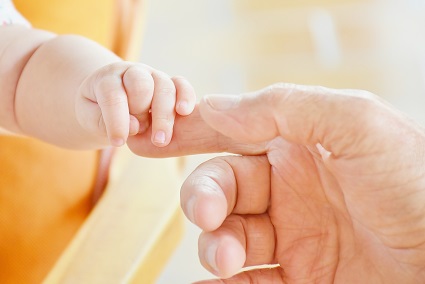
Spring 2019
Expansion of Women’s Health Research: Addressing Maternal Distress in the NICU
Victoria A. Grunberg, MS & Pamela A. Geller, PhD; Women's Health SIG

The Women’s Health SIG includes members with research interests that span diverse areas of health psychology. One area that is garnering increased attention among practitioners and researchers in the field, as well as public health groups and policy makers, is perinatal mental health. Recent decades have shown a rise in research and clinical attention around issues of childbearing, with a particular focus on postpartum depression and anxiety. In particular, research on high risk groups, including women with infants hospitalized in a Neonatal Intensive Care Unit (NICU), is expanding exponentially, generating opportunities for SBM members to enter this specialized field and extend their research programs into this arena.
“NICU mothers” report higher levels of post-traumatic, depressive, and anxiety symptoms (40-50%) compared to mothers with healthy infants (10-15%).1,2 Further, NICU mothers, especially those with high levels of anxiety, can demonstrate impaired mother-infant interaction and tend to engage in more intrusive parenting styles, which can negatively impact child development.4 The often unanticipated nature of the birth experience and NICU hospitalization, stress-inducing sights and sounds in the NICU, limitations on mother-child interactions (e.g., holding and feeding), unpredictability of medical procedures, and uncertainty of health outcomes in light of higher survival rates among medically complex infants, serve to create a traumatic environment.3,4
Women’s Health SIG co-chair Dr. Pamela Geller and her Women’s Health Psychology Lab at Drexel University are working in collaboration with Dr. Chavis Patterson (Director of Psychosocial Services) and NICU colleagues at The Children’s Hospital of Philadelphia (CHOP) to develop services and implement research geared to address maternal distress. We have developed and implemented a psycho-educational group intervention for parents during the first week of their child’s NICU hospitalization.3 The group encourages social support and provides information about family-centered neurodevelopmental care, medical providers, how to communicate effectively with the medical team, the emotional experience, and adaptive psychosocial coping strategies. A quality-improvement study screening parents for depression and trauma and connecting them to services within the first two weeks of their child’s NICU hospitalization is ongoing. The goal is to develop a standard of care for parental mental health screenings within a children’s hospital. A mindfulness-based stress-reduction intervention targeting mothers of infants with chronic lung disease also is being implemented (led by Christina DiSanza, MA; 2017-2018 Women’s Health SIG Student Liaison). “Mindful NICU” utilizes techniques such as mindful movement, awareness, and self-compassion to provide NICU mothers with tools to manage their mental health symptoms.
The fact that family systems influence child development years after NICU hospitalization has led to one of the first studies conducted at CHOP’s Neonatal Follow-Up Program, which provides outpatient medical services and developmental assessments for medically complex children post-NICU discharge. Specifically, a doctoral research study (led by Victoria Grunberg, MS, doctoral candidate and current Women’s Health SIG Student Liaison) is examining how maternal mental health, parental couple relationship, parenting alliance, mother-child relationships, family impact, and resources contribute to child cognitive and socio-emotional development. Together, these NICU-based projects aim to improve psychosocial services for NICU mothers and their children and families; something that is not always provided given that the child is the patient in the NICU.
Of interest to SBM members may be that the high prevalence of maternal distress in the NICU and its immense impact on maternal/family functioning and child developmental outcomes has raised awareness of the need for expanded service as well as the need for continued efforts to research maternal mental health in the NICU to improve child and family sequelae during and following hospitalization.3,5,6 Interdisciplinary research and collaborations across medical departments can help to overcome challenges associated with collecting data on mothers in the NICU. A more integrated and standardized approach to mental health treatment in the NICU will help to normalize maternal distress, identify mothers and families who would benefit from psychosocial treatment, and provide more effective services in this setting. SBM colleagues who are interested in learning more about the recent momentum of psychologist clinical and research activity in the NICU setting, opportunities for employment, or potential research collaborations, are invited to contact the authors.
References
- Agostini, F., Neri, E., Dellabartola, S., Biasini, A., & Monti, F. (2014). Early interactive behaviours in preterm infants and their mothers: influences of maternal depressive symptomatology and neonatal birth weight. Infant Behavior and Development, 37(1), 86-93.
- Anokye, R., Acheampong, E., Budu-Ainooson, A., Obeng, E. I., & Akwasi, A. G. (2018). Prevalence of postpartum depression and interventions utilized for its management. Annals of general psychiatry, 17(1), 18.
- Geller, P. A., Bonacquisti, A., & Patterson, C. A. (2018). Maternal Experience of Neonatal Intensive Care Unit Hospitalization: Trauma Exposure and Psychosocial Responses Motherhood in the Face of Trauma (pp. 227-247). New York, NY: Springer.
- Stephens, B. E., & Vohr, B. R. (2009). Neurodevelopmental outcome of the premature infant. Pediatric Clinics, 56(3), 631-646.
- Feldman, R., & Eidelman, A. I. (2009). Biological and environmental initial conditions shape the trajectories of cognitive and social-emotional development across the first years of life. Developmental Science, 12(1), 194-200.
- Weiss, S. J., & Chen, J.-L. (2002). Factors influencing maternal mental health and family functioning during the low birthweight infant's first year of life. Journal of Pediatric Nursing, 17(2), 114-125.